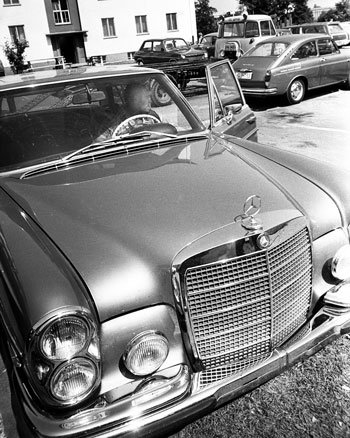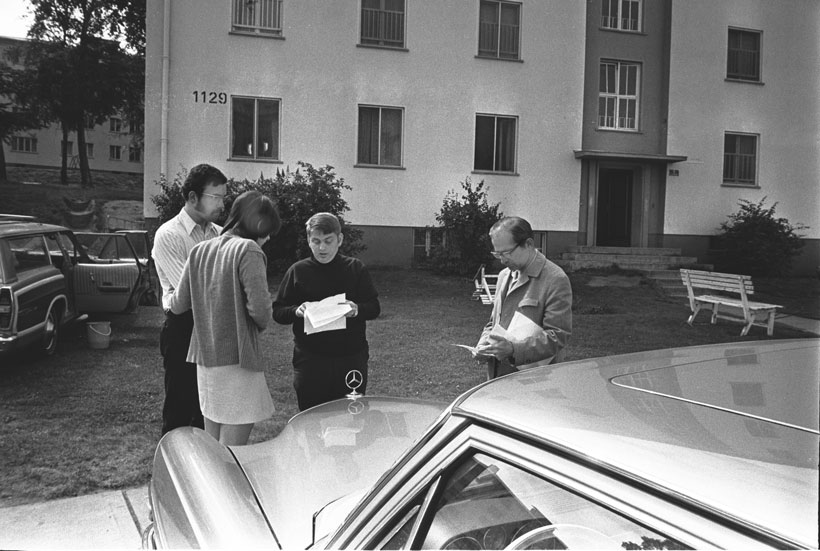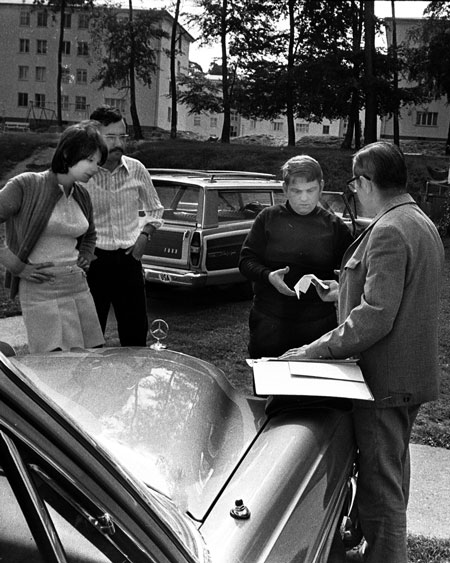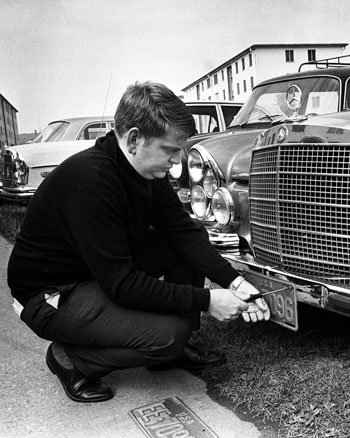A German Arrest Warrant, a Car Theft Ring, and a Smuggled Soldier’s Escape
I heard a shout, and two men barreled into my office like lions pouncing on a zebra, my sergeant hard on their heels. The big one was six feet-plus, a beefy nightclub bouncer in the gray-green uniform of a West German police officer. His right hand rested on a huge holster, from which protruded the butt of a small cannon.
The little guy did the talking.
“You are Herr Hauptmann Wolf?” he growled in a voice too deep for anyone barely five feet tall.
He was maybe 60 and looked like he had just stepped out of a 1930s movie; an old-fashioned brown suit, shiny from innumerable pressings, hung from his scrawny frame. A big, wide-brimmed brown fedora topped a head two sizes larger than his body.
“I tried to stop them—” my sergeant said. I waved him off.
Long before German reunification, I was the adjutant of the 11th Signal Battalion, in Kaiserslautern, West Germany. We operated multichannel data and voice microwave links between antiaircraft missile units across Western Europe. I handled correspondence for the commander, Lt. Col. James Norcross, wrote and signed a torrent of routine orders in his name, and supervised personnel matters.
I had also, of my own volition, written, directed, and produced a battalion orientation movie that proved as popular with our troops as it did with our parent organization, the 32nd Air Defense Command. That particular project earned me a few brownie points with the battalion commander and brought him many more from his superiors.
“Yes,” I replied to the little man in the bad suit. “What’s up?”
He waved a badge. “Stadtpolizei,” he announced. City police. His English was cloaked in a thick, guttural accent; he sounded like the villain in a postwar spy movie. Thumbing a notebook, he peered at me, watery blue eyes magnified by thick, rimless glasses.
“You are the owner of Mercedes-Benz Model 280S, engine number HR 18177491?”
“I don’t know the engine number. What’s this about?”
“This auto is in your possession?”
“Parking lot. What’s this about, please?”
“We will inspect this auto now.”
I followed him, the bouncer trailing. Outside, the tiny cop glanced at the notebook as I recited the VIN number.
“Ja,” he said. “We return to your office.”
“Would you mind telling me what this is about?”
“We WILL return to your office NOW!” he bellowed.
Behind my desk again, annoyed but curious, I opened my mouth to speak.
Tiny beat me to it.
“You will sit down.”
“What’s this about?”
“YOU WILL SIT DOWN!”
I sat.
“You are hereby informed that Mercedes-Benz Model 280S, serial number HR 18177491, is a stolen vehicle. You will not remove it from the Federal Republic of Germany. You will not sell it. You are not a suspect in any crime. We will contact you.”

Marvin Wolf behind the wheel of the metallic blue Mercedes he paid $5,500 for. (Photo courtesy of the author)
He turned and marched out, the bouncer at his heels.
A few months earlier, my venerable VW had begun to falter. I checked with a senior chaplain who had purchased five cars over three tours in Germany, and with a poker pal who was chief of Kaiserslautern’s traffic police. Both recommended Hans Paulin as an honest dealer who sold reliable cars and stood behind them.
Paulin was in his late 50s, spoke colloquial English, and had attended the University of Chicago at the same time as one of my uncles. He had two or three dozen cars on his lot, all about the same vintage as my VW. I wanted a BMW or Mercedes, two or three years old.
“A tall order,” Paulin replied. “We Germans take care of our cars and tend to keep them a long time. Why not a new Mercedes?”
I couldn’t afford one. And it could take a year; at that time, every Mercedes was built to order.
“It’s sometimes possible to get one sooner. Maybe only two or three months,” Paulin said, explaining that occasionally a buyer changed his mind and forfeited his deposit, and the car was nevertheless built. Some people took delivery, then decided they didn’t like the color or weren’t satisfied with the vehicle options they’d ordered. “We Germans are very finicky,” he added.
I nodded, thinking it over.
“These cars have a few thousand kilometers, so Daimler discounts them. You can save a bundle.”
“You can get one?”
“I have a friend. …”
Over the next month, I toured Kaiserslautern’s other used-car lots; none offered more than Paulin. I got my VW running well again and had almost forgotten Paulin. Then he called. He had a near-new Mercedes, metallic blue, with a five-speed manual transmission and a sunroof, for $5,500.
That was expensive on a captain’s pay, but the moment my wife and I saw the car, we fell in love with it.
I arranged a bank loan; four days later, I was driving a Mercedes. My wife and I took weekend trips to Antwerp, Paris, Amsterdam, and Munich, flashing down the Autobahn in comfort and safety at almost 100 mph. My wife, who constantly complained of motion sickness in the Volkswagen, talked about driving lessons. Then she was summoned to Seoul on family business.

Marvin Wolf, center, reads a letter of protest to the city of Kaiserslautern bailiff, right, while reporters from Overseas Weekly listen. The seizure was in violation of the Status of Forces Treaty between the United States and the Federal Republic of Germany. (Photo courtesy of the author)
A week later, when the police burst my bubble, the Overseas Weekly’s front-page story “The Hot Wheels Club” described how a ring of thieves bribed dealership mechanics to duplicate ignition keys and then stole the cars from owners’ homes. My stolen 280S was one of 89 sold to American servicemen.
German car buyers and sellers are required to visit a police station; sellers show ID and a title book that’s checked against a national database to confirm ownership. But the Bonn government denied our military police access to their computer; it was an “infringement of sovereignty.” All I needed for US Forces registration was a bill of sale and a title book.
Or even a counterfeit title book.
Paulin’s lot was shuttered, his phone disconnected. I hired a local lawyer, who within 24 hours told me that, although Paulin was wealthy, all of his assets were held in his wife’s name and therefore could not be seized to satisfy a debt. A week later, the newspapers reported that Paulin was in jail, awaiting trial on half a dozen charges.
A German insurance company contacted me with an offer: I could buy the car from them for the cost of their settlement with the rightful owner: $6,700.
There was no way I could afford to buy that car a second time, so I politely declined their offer. They wrote back and offered to reduce the price to $6,100.
Same answer.
My insurance company told me that buying stolen property wasn’t covered. I wrote to my bank in College Park, Maryland, to explain the situation and acknowledge that I had every intention of repaying their loan. A senior bank official called me to say that he and the bank appreciated my candor. To help ease the burden, they would cut my interest rate by a point and give me two additional years to pay.
The same day, my wife called to say that she needed to stay in Korea a bit longer.
I received a terse notice from the Kaiserslautern High Court ordering me to deliver my car to its rightful owner in Hamburg.

Marvin Wolf accepts a receipt for his seized car. (Photo courtesy of the author)
In response, I wrote that military duties prevented me from making that 600-mile round trip. The court replied that a bailiff would make arrangements to retrieve the car.
A US Army Judge Advocate Corps attorney explained that seizure by Kaiserslautern authorities violated the Status of Forces treaty between the United States and Germany. Such matters had to go through German Federal channels to the US ambassador and then down through military channels to my commander. Local cops couldn’t confiscate my car.
“I can keep the car?” I said.
“No,” my lawyer said, “If you don’t surrender it, they’ll arrest you and take the car, anyway. While you’re in jail, they’ll do things the proper way. Then they’ll apologize. It’s a question of whether you want to spend a few weeks behind bars until we sort it out or give them the damn car.”
Days later, a balding, middle-aged man in coveralls came to my apartment in the Army housing area to present me with a document in English and German. “Please, the Mercedes keys give to me,” he said.
“First the license plates I must remove,” I replied.
“A civil employee I am. Without license plates, authorization to drive I have not.”
“The plates are US government property. To the US military police the plates I must return.”
He scratched his head. “In one hour, I will return.”
Award-Winning Journalism in Your Inbox
He came back behind the wheel of a long tractor-trailer, a “lowboy,” and after I removed both plates, he drove my car up a ramp and secured it with canvas straps attached to steel rings embedded in the truck bed.
A week dragged by. My wife wrote that she’d found a baby to adopt, a notion we had often discussed. She asked if I could come to Seoul.
I’d been thinking about requesting a transfer; I wouldn’t need wheels in Korea, wouldn’t have to make double car payments. Now I had a better reason. Lt. Col. Norcross was sympathetic; he told me to submit paperwork and promised to grease the bureaucratic wheels by calling a West Point classmate who worked in the Pentagon.
Two weeks later, I received orders for Korea. The same day, I got an invoice from the bailiff’s office: I was to pay 101 Deutschmarks and fifty pfennigs—about $35—for the truck that hauled off my car. I threw the bill away. A week later, another bill. I tossed it, as I did the third bill the next week.
Six days before my scheduled departure, I turned in my quartermaster furniture and shipped my household goods.
The next day, a special delivery letter arrived: Pay the $35 within seven days or face arrest.
I was out $5,500, and they were treating me like a criminal! I wrote an angry essay of my grievances in the form of a letter to the court.
Couched in somewhat more elegant language, I said, essentially: Screw you, Germany, we won the war. I couldn’t have bought a stolen car if you fools had allowed the US Forces the ability to verify ownership. The confiscation was illegal under a treaty between Germany and the United States. Charging me for recovering the car is outrageous, and I won’t pay.
I felt much better after writing that letter.
Then I made a big mistake: I mailed it.
The day before my scheduled departure, while I was visiting the PX, the manager hailed me.
“Your colonel is on the phone,” he said.
“Six of the biggest German cops I’ve ever seen just left,” Norcross said. “They have an arrest warrant. What the hell was in that letter?”
Suddenly, I realized my mistake: The Deutsche Bundespost, or German mail, often delivered mail the same day it was posted.
“If they can’t take a joke, I guess I’ll just pay the damn money,” I said.

Marvin Wolf removes U.S. Army license plates before surrendering his Mercedes to the bailiff. (Photo courtesy of the author)
“Too late for that. Don’t come here. Don’t go to your quarters. Stay away from bars, restaurants, public places. After dark, go to Maj. Grotegut’s house.”
Grotegut was the battalion executive officer and lived on a farm outside the city.
“Yes, sir,” I said.
“I’ll send someone for your baggage, and I’ll get you to the airport tomorrow.”
My plane was scheduled to depart at 4 p.m. Norcross came for me at dawn, his jeep dressed for a field exercise: draped in camouflage netting, with green duct tape obscuring unit bumper markings.
By Autobahn, Frankfurt was three hours. We took back roads, avoiding cities. Daylight was fading, and it had begun to snow when we reached Rhein-Main Air Force Base, which shares runways with Frankfurt International Airport. We parked near the military terminal, and I hid in the curtained jeep while Norcross went into the terminal.
Two German police sedans arrived. Through the swirling snow, I saw six mammoth cops and a tiny man in a big hat and a double-breasted trench coat rush the terminal.
My stomach did flip-flops. Minutes dragged by until Norcross returned. With a conspiratorial grin, he told me that I was on a civilian charter flight. He handed me a boarding pass, then directed his driver on a roundabout route through the base to an unpaved access road. The gate was conveniently unlocked. At the end of the road, we pulled into a copse of trees behind a wide, paved apron where departing flights turned from the taxiway onto the departure runway. In minutes, snow covered the jeep, and we were all but invisible in the evening twilight.
We waited, shivering. After a while, I noticed that although a plane landed every few minutes, none took off.
“I’m pretty sure the police shut down the departure gates,” Norcross said. “When I left the terminal, they were searching it and all the loaded aircraft.”
An hour later, the wind picked up and the skies cleared. About an hour after that, departures resumed. Plane after plane roared off into a starry night. Finally, a Saturn Airlines Boeing 727 taxied toward us, then rocked to a halt on the runway about 50 yards from our trees. Its landing lights flashed three times.
“That’s you,” Norcross said as he reached across the driver and flashed the jeep lights once, twice, three times.
“How did you arrange that, sir?”
“None of your business.”
Taxiing slowly, the plane turned until its tail pointed at our jeep. “Go now,” Norcross said.
“How can I ever thank you, sir?”
“Remember me in your memoirs. Get going before he leaves without you.”
As I left the jeep, a hatch below the tail opened. A stair ramp descended to the runway as I picked my way through snowdrifts. Suddenly, distant headlights swept across the plane. Two sedans swerved and skidded toward us from far down the access road, flashing blue lights and sirens. Slipping and sliding across the icy Tarmac, I heard the shriek of brakes. Car doors slammed. Boots crunched snow. Men were running.
Heart racing, I reached the ramp. A steward at the top spoke into a telephone. Another steward threw my duffle bag and suitcase up the stairs and through the hatch, and as I ran up the ladder, the engines surged to full power.
The steward slammed the hatch shut behind me. Heads craned as I found a vacant seat. We rolled forward, faster and faster until, engines screaming, we hurtled skyward.
About 15 minutes later, the captain announced that we had cleared German airspace. Oddly, several passengers clapped. A flight attendant made her way to me, then invited me to join the captain in the cockpit.
As we shook hands, I noticed his ring: West Point.
Our Journalism Depends on Your Support
Two decades earlier, he explained, Lt. Col. Norcross and he had shared a room at the Military Academy.
“What the hell did that letter say?” the pilot asked, and howled when I told him.
“Jimmy said that you possessed rare talent as a writer,” he said and laughed again.
I thanked him profusely. “He said you were one of his most promising officers,” he replied.
I returned to my seat with gifts: several tiny bottles of Scotch.
As I fastened my seatbelt, a well-dressed older woman, perhaps a senior officer’s wife, leaned across the aisle.
“What was all that business on the runway?” she whispered. “Why didn’t you board at the terminal?”
“I wrote an essay,” I replied.
“I don’t understand—some sort of contest?”
“First prize was a Mercedes 280S.”
“And you won?”
“I was runner-up,” I said and chugged the first Scotch.
This War Horse reflection was written by Marvin J. Wolf, edited by Kristin Davis, fact-checked by Jess Rohan, and copy-edited by Mitchell Hansen-Dewar. Abbie Bennett wrote the headlines.





Comments are closed.